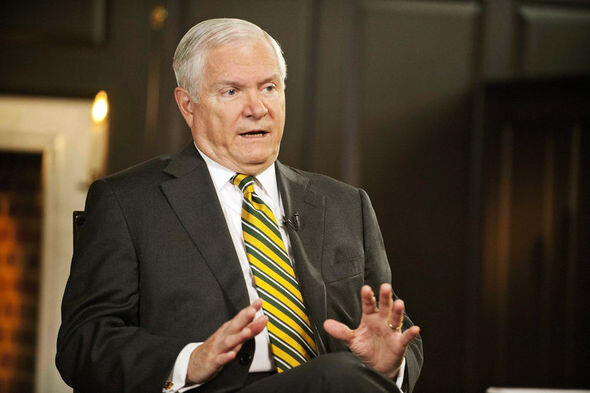hankyoreh
Links to other country sites 다른 나라 사이트 링크
Let North Korea keep some nukes? Robert Gates lays out a vision for a solution

The opinion that North Korea should be guaranteed nuclear missiles in a limited capacity, and that there should be a change in the military forces stationed on the Korean peninsula, has made its way into mainstream discourse in the US as the solution to North Korean nuclear and missile issues.
Former US Secretary of Defense Robert Gates proposed that acknowledging the North Korean regime, signing a peace treaty with the regime, and partially changing the structure of the US forces stationed within South Korea would be necessary to the solution. Going further, he even laid out a plan in which North Korea would be guaranteed its nuclear weapons, under the condition of inspections. These opinions were published in Wall Street Journal columnist Gerald F. Seib’s piece on July 10 in the Journal, based on an interview with Gates and titled, “What Would Gates Do? A Defense Chief’s Plan for North Korea.”
Gates worked with the Central Intelligence Agency (CIA) during the Lyndon Johnson administration in the 1960s, and served as CIA director and Secretary of Defense in both Republican and Democratic administrations. In the security field in the US, Gates is representative of a mainstream, realistic approach.
Gates posits three principles for the solution of the North Korean nuclear problem: the exclusion of a military strike on North Korea as an option, the acknowledgement of China’s crucial role, and the need for a preliminary agreement with China before any direct negotiations with North Korea. He argues that, in accordance with these principles, the US should demonstrate to China that it is ready to acknowledge the North Korean regime and giving up its policy of pushing for regime change, prepare for the signing of a peace treaty with North Korea, and consider the partial change of the structure of the US armed forces in South Korea.
In particular, Gates also proposed a system wherein North Korea would be guaranteed its nuclear weapons in a limited capacity, under the condition of inspections. In other words, the US would propose to China that although North Korea would be permitted, in this limited capacity, to retain 10 to 20 nuclear weapons, it would have to agree to inspections to ensure that it would not acquire additional nuclear weapons or further develop the reach of the weapons.
Gates’ program of guaranteeing North Korea’s nuclear weapons seems to be a system wherein the nuclear weapons are not destroyed, but maintained in a permanently stunted program. Gates said, “I think you cannot get the North to give up their nuclear weapons,” and “Kim sees them as vital to survival. But you may be able to get them to keep the delivery systems to very short range.”
Gates argued that only after China agreed to these proposals would the US be able to begin negotiating with North Korea directly. Gates said, “If that is an outcome you cannot accept, we are going to take steps in Asia you hate.” Meaning the US could, heavily populate Asia with missile defenses,“ including missile-defense buildups in South Korea, Japan and aboard US ships stationed in the Pacific.
By Jung E-gil, senior staff writer
Please direct questions or comments to [english@hani.co.kr]

Editorial・opinion
![[Column] Park Geun-hye déjà vu in Yoon Suk-yeol [Column] Park Geun-hye déjà vu in Yoon Suk-yeol](https://flexible.img.hani.co.kr/flexible/normal/500/300/imgdb/original/2024/0424/651713945113788.jpg) [Column] Park Geun-hye déjà vu in Yoon Suk-yeol
[Column] Park Geun-hye déjà vu in Yoon Suk-yeol![[Editorial] New weight of N. Korea’s nuclear threats makes dialogue all the more urgent [Editorial] New weight of N. Korea’s nuclear threats makes dialogue all the more urgent](https://flexible.img.hani.co.kr/flexible/normal/500/300/imgdb/original/2024/0424/7317139454662664.jpg) [Editorial] New weight of N. Korea’s nuclear threats makes dialogue all the more urgent
[Editorial] New weight of N. Korea’s nuclear threats makes dialogue all the more urgent- [Guest essay] The real reason Korea’s new right wants to dub Rhee a founding father
- [Column] ‘Choson’: Is it time we start referring to N. Korea in its own terms?
- [Editorial] Japan’s rewriting of history with Korea has gone too far
- [Column] The president’s questionable capacity for dialogue
- [Column] Are chaebol firms just pizza pies for families to divvy up as they please?
- [Column] Has Korea, too, crossed the Rubicon on China?
- [Correspondent’s column] In Japan’s alliance with US, echoes of its past alliances with UK
- [Editorial] Does Yoon think the Korean public is wrong?
Most viewed articles
- 1[Column] Park Geun-hye déjà vu in Yoon Suk-yeol
- 2Thursday to mark start of resignations by senior doctors amid standoff with government
- 3N. Korean hackers breached 10 defense contractors in South for months, police say
- 4[Editorial] New weight of N. Korea’s nuclear threats makes dialogue all the more urgent
- 5Will NewJeans end up collateral damage in internal feud at K-pop juggernaut Hybe?
- 6Kim Jong-un expressed ‘satisfaction’ with nuclear counterstrike drill directed at South
- 7[Editorial] Japan’s rewriting of history with Korea has gone too far
- 8[Column] ‘Choson’: Is it time we start referring to N. Korea in its own terms?
- 9[Cine feature] A new shift in the Korean film investment and distribution market
- 10[Column] The clock is ticking for Korea’s first lady